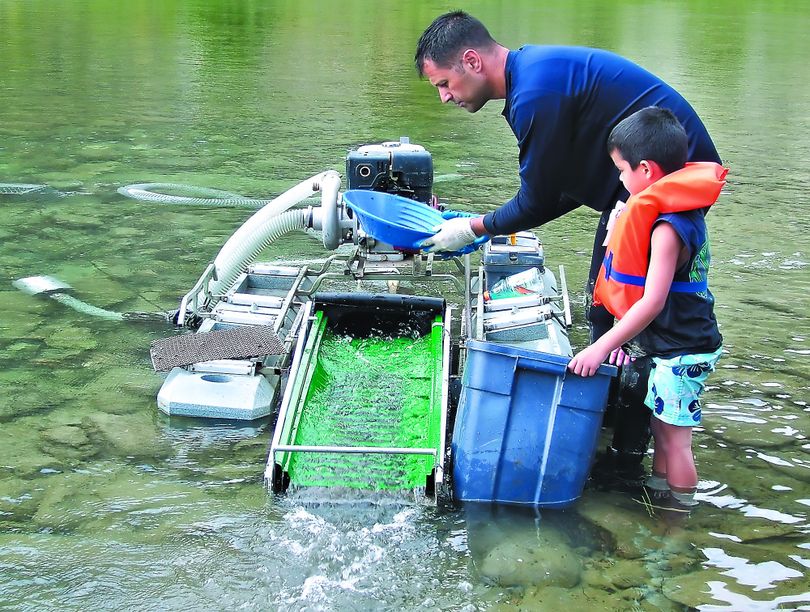Idaho river dredgers want it all in effort to snub feds

RIVERS -- The latest anti-government greediness to surface in the 2015 Idaho Legislature is the effort by gold dredgers who want to have their way with some of the state's cherished fishing streams.
But they're trying to soften the impact of that potential resource destruction by suggesting they're actually just trying to fight federal overreach. And everybody's OK with that -- right?
Rep. Paul Shepherd, R-Riggins, is sponsoring a bill, approved in committee and headed for a House vote, says the state comprehensive water plan "shall allow for recreational prospecting and small-scale dredge mining without regulation, restriction, limitation or prohibition." It also exempts dredge miners from state laws prohibiting the alteration of stream channels, as well as state water quality requirements.
Following is a more detailed account from Boise by William Spence of the Lewiston Tribune:
BOISE - A revamped dredge mining bill that exempts small-scale gold miners from state regulation narrowly prevailed in the Idaho House Resources and Conservation Committee Tuesday and now goes to the full House.
An earlier version of the legislation exempted dredge miners from federal regulations. It was pulled, however, because of concerns about violating the U.S. Constitution’s Supremacy Clause.
The new measure takes a different approach, protecting miners from state regulations - even though the proponents themselves said they "enjoy" Idaho’s permitting process.
The bill, which was sponsored by Rep. Paul Shepherd, R-Riggins, says the state comprehensive water plan "shall allow for recreational prospecting and small-scale dredge mining without regulation, restriction, limitation or prohibition." It also exempts dredge miners from state laws prohibiting the alteration of stream channels, as well as state water quality requirements.
Don Smith, a Riggins dredge miner who presented the bill for Shepherd, offered a lengthy legal argument, defending the proposed protections based on the 1872 Mining Act and the U.S. and Idaho constitutions.
"The issue in Idaho is that some (dredge mining) permits have been denied," he said. "This is in violation of federal law, the Constitution and the spirit of the state Constitution."
Forrest Goodrum, a Boise attorney representing the Ada County Fish and Game League, said if miners have such a strong legal case against regulation, they should take it to a judge, not to the Legislature.
"I’ve been a practicing attorney for over 40 years, and this bill is one of the worst mishmashes I’ve ever seen offered to a legislative body," he said. "They’re asserting that the Mining Act supersedes all other regulation. If they think they have a case, the courthouse is within walking distance. Why try the case here?"
Several dredge miners spoke in favor of the bill, saying it’s a small step toward the larger goal of pushing back against the federal government.
"The way to boil a frog is to slowly turn up the heat," said Jay Wilson. "In my opinion, the federal government is trying to boil us. ... We live in a free country, but we’re being regulated to death. It’s choking the economy. You guys have the ability to step up and do what’s right. This bill is the state taking the pot away from the federal government."
Rep. Mat Erpelding, D-Boise, questioned that logic. He noted dredge miners have never complained about state regulations; the focus has always been on the U.S. Environmental Protection Agency.
"If the federal regulations are still in place, explain to me how this fixes the problem," he said.
David Claiborne, a Boise attorney who helped rewrite the bill, said it’s part of a longer-term effort.
"The process employed by state agencies just compounds the problems miners have to go through at the federal level," he said. "We have to approach this incrementally. We’re not going to be able to address everything in one bill. We’re also working on the federal issues with Idaho’s congressional delegation."
Several Resources Committee members said they were uncomfortable giving dredge miners a complete pass from state regulations. However, a motion to send the bill to the House amending order for changes failed on a 10-7 vote.
A motion to send the bill to the House floor with a favorable recommendation then passed on a 9-8 vote. If it’s approved in the House, it will move to the Senate for further action.
